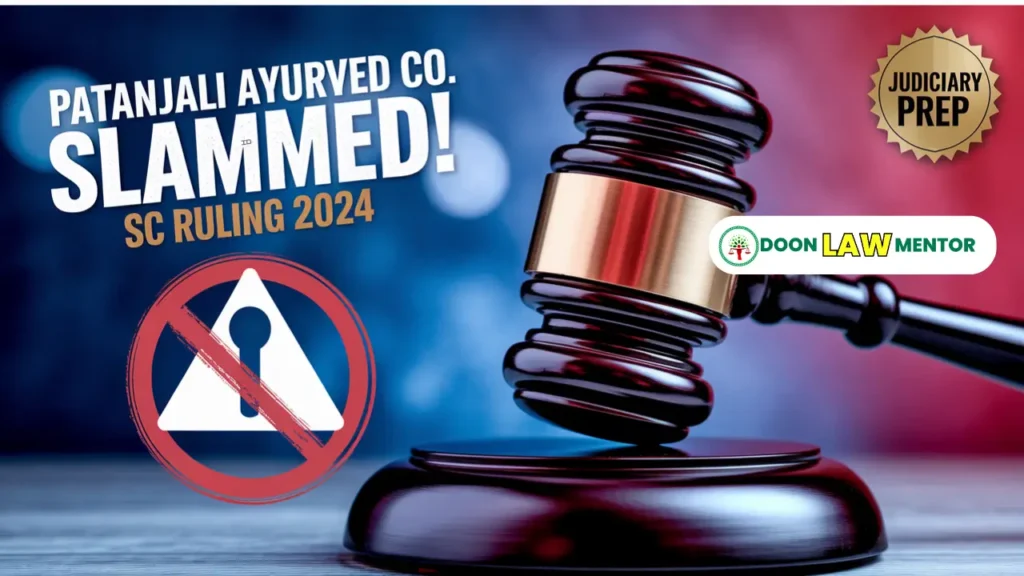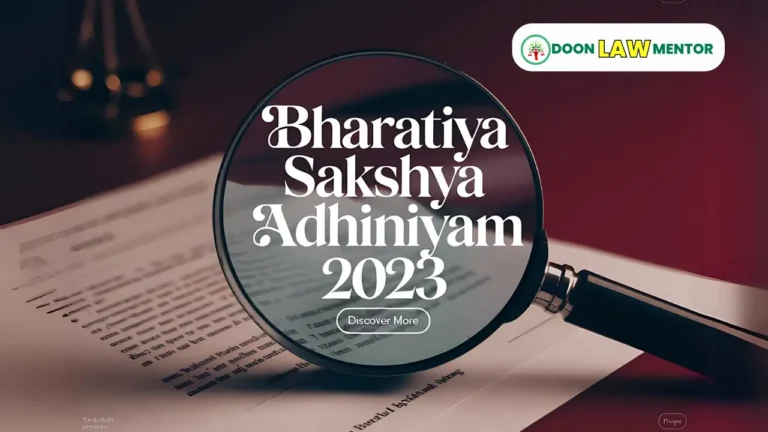In a 2024 ruling in Indian Medical Association v. Patanjali Ayurved, the Supreme Court issued a contempt notice in the Patanjali Misleading Ads Contempt case, slamming Patanjali for false medical claims under the Drugs and Magic Remedies Act, 1954. This verdict protects consumer rights. This blog explains the Patanjali Misleading Ads Contempt ruling for Judiciary, APO, and JLO aspirants preparing for 2025 exams.
Table of Contents
Introduction
In a fiery ruling on February 27, 2024, the Supreme Court of India issued a contempt notice in the Patanjali Misleading Ads Contempt case, slamming Patanjali Ayurved, led by Baba Ramdev and Acharya Balkrishna, for repeatedly violating court orders against publishing misleading advertisements. The case, Indian Medical Association v. Patanjali Ayurved, centers on Patanjali’s claims of “permanent cures” for serious ailments, which contravene the Drugs and Magic Remedies (Objectionable Advertisements) Act, 1954. The Court expressed strong disapproval of Patanjali’s defiance and also questioned the central government’s inaction.
This verdict is a landmark in regulating deceptive advertising and protecting consumer rights. For Judiciary, APO, and JLO aspirants, the Patanjali Misleading Ads Contempt ruling is a must-know for your 2025 exams, offering insights into consumer protection and judicial oversight. This blog explains the case in simple language, covering all key points to help you prepare.
What Happened in Indian Medical Association v. Patanjali Ayurved (2024)?
The Patanjali Misleading Ads Contempt case arose from a long-standing dispute over Patanjali Ayurved’s advertising practices. Let’s explore the background.
Patanjali’s Misleading Claims
Patanjali Ayurved, a prominent Indian company known for its Ayurvedic products, was accused of publishing misleading advertisements. The company, led by Baba Ramdev and Acharya Balkrishna, claimed that its medicines offered “permanent relief or cure” for serious ailments like diabetes, asthma, psoriasis, and sexual disorders. These claims were promoted through various media, including print, television, and social media platforms. However, such assertions violate the Drugs and Magic Remedies (Objectionable Advertisements) Act, 1954, which prohibits advertisements claiming miraculous or permanent cures for certain diseases, setting the stage for the Patanjali Misleading Ads Contempt proceedings.
Indian Medical Association’s Petition
In August 2022, the Indian Medical Association (IMA) filed a petition in the Supreme Court, alleging that Patanjali’s advertisements were misleading and harmful to public health, leading to the Patanjali Misleading Ads Contempt case. The IMA argued that Patanjali’s claims lacked scientific evidence and created false hope among consumers, potentially deterring them from seeking proper medical treatment. The petition also accused Patanjali of making derogatory remarks against allopathic medicine and doctors, further escalating tensions. The Supreme Court, led by Chief Justice D.Y. Chandrachud and Justice J.B. Pardiwala, took up the case and issued a directive on August 23, 2022, ordering Patanjali to stop publishing such misleading advertisements immediately.
Patanjali’s Defiance
Despite the Supreme Court’s order, Patanjali continued its advertising practices, escalating the Patanjali Misleading Ads Contempt issue. On November 21, 2023, the Court issued another warning, reiterating that Patanjali must comply with the 1954 Act and stop making false claims about curing diseases. The Court also cautioned the company against disparaging other medical systems, like allopathy. However, just one day later, on November 22, 2023, Patanjali held a press conference where Baba Ramdev and Acharya Balkrishna repeated the same claims, asserting that their products could permanently cure ailments like diabetes and asthma.
They also made statements criticizing allopathy, claiming Patanjali’s medicines were superior. This blatant defiance prompted the Supreme Court to initiate contempt proceedings in the Patanjali Misleading Ads Contempt case.
Read More: Forgery Before Court? Supreme Court Clears Key Doubts
Contempt Proceedings Initiated
On February 27, 2024, the Supreme Court initiated action in the Patanjali Misleading Ads Contempt case by issuing a contempt notice to Patanjali Ayurved, Baba Ramdev, and Acharya Balkrishna for violating its orders. The Court barred Patanjali from advertising any products claiming to cure diseases listed under the Drugs and Magic Remedies Act, 1954, until further notice. It also directed Ramdev and Balkrishna to appear in court personally at the next hearing, scheduled for March 19, 2024, to explain their actions. The Court’s decision came after the IMA presented evidence of Patanjali’s continued advertisements, including social media posts and press conference statements, further highlighting the severity of the Patanjali Misleading Ads Contempt issue.
What Did the Supreme Court Say?
The Supreme Court made several key observations in the Patanjali Misleading Ads Contempt ruling, expressing strong disapproval of Patanjali’s actions. Let’s break down its findings.
Defiance of Court Orders
The Court was highly critical of Patanjali’s blatant disregard for its directives in the Patanjali Misleading Ads Contempt case. It noted that despite clear orders on August 23, 2022, and November 21, 2023, to stop misleading advertisements, Patanjali held a press conference the very next day, repeating the same claims. The Court said, “The entire country has been taken for a ride,” highlighting the seriousness of Patanjali’s defiance. It emphasized that such actions undermine the authority of the judiciary and cannot be tolerated, especially when they involve public health. The contempt notice was issued to hold Patanjali accountable for violating court orders.
Questioning Government Inaction
The Court questioned the central government’s lack of action against the Patanjali Misleading Ads Contempt violations for over two years, despite the company’s repeated breaches of the Drugs and Magic Remedies Act, 1954. It asked, “What has the Government of India done in the last two years to enforce the Act?” The Additional Solicitor General (ASG), representing the government, tried to shift the blame to state governments, arguing that they are responsible for enforcement under the Act. However, the Court rejected this argument, stating that the central government has a primary duty to ensure compliance with laws related to public health. The Court directed the Union Government to file an affidavit within two weeks, detailing the actions taken to address Patanjali’s violations.
Immediate Ban on Misleading Ads
The Court imposed an immediate ban on all advertisements in the Patanjali Misleading Ads Contempt case that claimed to cure diseases listed under the Drugs and Magic Remedies Act, 1954. It said, “The advertisements claiming cure for diseases mentioned under the Act are banned with immediate effect.” The Court listed diseases like diabetes, asthma, and sexual disorders, which are covered under the Act, and prohibited Patanjali from making any such claims in its marketing materials, including print, TV, and social media. This ban aims to protect consumers from false hope and ensure they seek proper medical treatment.
Read More: No Suitable Candidates Found for District Judge Promotion : RAJ HC
Protecting Public Health
The Court emphasized that the Patanjali Misleading Ads Contempt practices pose a serious threat to public health. It noted that Patanjali’s claims of “permanent cures” could deter consumers from seeking evidence-based medical treatment, potentially worsening their health conditions. The Court also took issue with Patanjali’s disparagement of allopathy, saying, “The company cannot denigrate other systems of medicine while promoting its products.” The ruling underscores the judiciary’s role in safeguarding public interest by regulating deceptive advertising practices.
Relevant Laws in the Case
Let’s understand the laws and legal principles involved in the Patanjali Misleading Ads Contempt ruling in simple words.
Drugs and Magic Remedies (Objectionable Advertisements) Act, 1954
The Drugs and Magic Remedies Act, 1954, is a law that regulates advertisements for medicines and treatments in India. It aims to protect consumers from false claims that could harm their health. Key provisions invoked in this case include:
- Section 3: Prohibits advertisements of drugs or remedies claiming miraculous or permanent cures for certain diseases, such as diabetes, asthma, and sexual disorders.
- Section 4: Bans misleading advertisements that create false impressions about a product’s effectiveness or safety.
- Section 7: Provides punishment for violations, including imprisonment for up to six months, a fine, or both.
The Supreme Court found that Patanjali’s advertisements claiming “permanent cures” violated Sections 3 and 4 of the Act, as they lacked scientific evidence and misled consumers, contributing to the Patanjali Misleading Ads Contempt controversy.
Consumer Protection Act, 2019
The Consumer Protection Act, 2019 (which replaced the 1986 Act), protects consumers from unfair trade practices and ensures their right to safe goods and services. The IMA invoked this Act, arguing that the Patanjali Misleading Ads Contempt practices constitute an unfair trade practice under Section 2(47). This section defines unfair trade practices as any act that misleads consumers or promotes goods with false claims. The Supreme Court’s ban on Patanjali’s misleading ads aligns with the Act’s goal of protecting consumers from deceptive marketing.
Article 129 of the Constitution
Article 129 of the Constitution gives the Supreme Court the power to punish for contempt of court. Contempt includes any act that disobeys court orders or undermines its authority. The Supreme Court issued a contempt notice in the Patanjali Misleading Ads Contempt case under Article 129 because the company violated its August 2022 and November 2023 orders to stop misleading advertisements. The Court directed Baba Ramdev and Acharya Balkrishna to appear personally to explain their defiance, showing its authority to enforce compliance.
Article 21 of the Constitution
Article 21 guarantees the right to life and personal liberty, which includes the right to health and access to accurate medical information. The Supreme Court’s intervention in the Patanjali Misleading Ads Contempt case protects Article 21 by ensuring consumers are not misled by false health claims that could harm their well-being. The Court’s ban on misleading ads safeguards public health, aligning with the constitutional right to a healthy life.
A Famous Case on Contempt of Court
In 1996, the Supreme Court gave a ruling in T.N. Godavarman Thirumulpad v. Union of India. The Court clarified that willful disobedience of its orders constitutes contempt under Article 129, and it can take action to enforce compliance, especially in public interest matters. The Patanjali Misleading Ads Contempt ruling follows this principle by initiating contempt proceedings against Patanjali for defying court orders, ensuring the judiciary’s authority is upheld.
What Does This Ruling Mean?
The Patanjali Misleading Ads Contempt ruling has significant implications for advertising ethics, consumer protection, and judicial oversight in India. Let’s break down its meaning in simple terms.
Good Points of the Ruling
- Protects Public Health: The Court’s ban on Patanjali Misleading Ads Contempt claims ensures that consumers are not deceived by false claims of “permanent cures,” encouraging them to seek proper medical treatment.
- Enforces Judicial Authority: By addressing Patanjali Misleading Ads Contempt through a contempt notice, the Court sends a strong message that no one, not even influential companies like Patanjali, can defy its orders without consequences.
- Holds Companies Accountable: The ruling sets a precedent that companies must follow advertising laws and cannot make unverified health claims, promoting ethical marketing practices.
- Pressures Government Action: The Court’s directive to the government to explain its inaction in the Patanjali Misleading Ads Contempt case pushes for better enforcement of the Drugs and Magic Remedies Act, ensuring stricter regulation of health-related ads.
Things to Think About
- Will Patanjali Comply? Despite the ban in the Patanjali Misleading Ads Contempt ruling, Patanjali might find ways to continue misleading ads through indirect means, like social media influencers. The Court will need to monitor compliance closely.
- Government’s Role in Enforcement? The Court asked the central government to act in the Patanjali Misleading Ads Contempt case, but will it enforce the 1954 Act effectively across all states? Lack of coordination could weaken the ruling’s impact.
- Impact on Ayurvedic Industry? Some might argue that the Patanjali Misleading Ads Contempt ruling unfairly targets Ayurvedic companies like Patanjali, while other medical systems face less scrutiny. The government might need to clarify advertising rules for all sectors.
- Consumer Awareness Challenges: Many consumers might still believe Patanjali’s claims due to Baba Ramdev’s popularity, despite the Patanjali Misleading Ads Contempt verdict. More public education might be needed to counter misinformation.
Why This Matters
The Patanjali Misleading Ads Contempt ruling is a landmark in consumer protection and advertising regulation. It ensures that companies cannot mislead consumers with false health claims, protecting public health and upholding the rule of law. The ruling also shows the judiciary’s power to enforce compliance and hold both companies and the government accountable. Aspirants should learn this because it highlights the intersection of consumer law, public health, and judicial authority.
Why This Matters for Judiciary, APO, and JLO Aspirants
The Patanjali Misleading Ads Contempt ruling is crucial for your 2025 exams. For Prelims, learn the case name Indian Medical Association v. Patanjali Ayurved (2024), Drugs and Magic Remedies Act Sections 3, 4, and 7, Article 129, and Article 21. For Mains, write essays on misleading advertisements, consumer protection, or the judiciary’s role in public health, using this case. For Interviews, talk about how this ruling enforces ethical advertising and protects consumers.
Conclusion
The Patanjali Misleading Ads Contempt ruling in Indian Medical Association v. Patanjali Ayurved (2024) is a powerful assertion of judicial oversight over deceptive advertising in India. The Supreme Court addressed Patanjali Misleading Ads Contempt by issuing a contempt notice to Patanjali Ayurved, Baba Ramdev, and Acharya Balkrishna for defying its orders to stop misleading ads claiming “permanent cures” for diseases like diabetes and asthma, violating the Drugs and Magic Remedies Act, 1954. The Court banned such advertisements, criticized the government’s inaction, and directed it to report enforcement actions.
This verdict protects public health, ensures consumer rights, and reinforces the judiciary’s authority under Article 129. For Judiciary, APO, and JLO aspirants, this case is very important for your 2025 exams. It teaches you about advertising laws, consumer protection, and the Supreme Court’s contempt powers. Study the Patanjali Misleading Ads Contempt ruling to do well in your exams. Start preparing with this case today to reach your goals in 2025!
#PatanjaliMisleadingAdsContempt, #IndianMedicalAssociationvPatanjali2024, #SupremeCourtPatanjali, #JudiciaryExams #doonlawmentor









